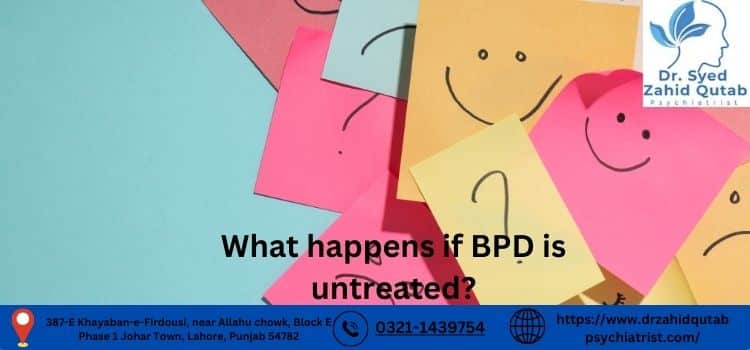BPD (Borderline Personality Disorder) is a mental health condition that can affect someone’s life severely. Now the question arises What happens if BPD is untreated?
Untreated Borderline Personality Disorder (BPD) can lead to a myriad of challenges that not only affect the individual but also impact their relationships, work life, and overall well-being.
Let’s dive in to get more details.
What happens if BPD is untreated?

If BPD is left untreated then it can lead to many challenges that can affect their whole life. Some of their conditions are mentioned below:
Emotional Instability
One of the hallmark symptoms of Borderline Personality Disorder is emotional instability, which manifests as extreme fluctuations in mood. Individuals may experience intense episodes of anger, anxiety, or depression that can occur rapidly and without an obvious trigger. These mood swings can last from a few hours to several days, making it challenging for those affected to maintain stable relationships or a consistent daily routine.
The unpredictability of these emotional states can lead to feelings of confusion and distress, both for the individual and their loved ones. It is vital to acknowledge that this emotional rollercoaster is not merely a matter of temperament but is rooted in the underlying neurobiological and psychological aspects of BPD. Addressing emotional instability through therapeutic interventions can significantly enhance emotional regulation and overall quality of life.
Impulsivity and Reckless Behavior
Impulsivity is another predominant characteristic of Borderline Personality Disorder, often leading individuals to engage in risky or dangerous behaviors without considering the potential consequences. This can manifest in various ways, such as reckless driving, substance abuse, or compulsive spending. Such actions are often driven by an immediate desire for relief from emotional pain or a craving for excitement, highlighting the difficulty in managing impulses. Unfortunately, these reckless behaviors can result in detrimental outcomes, including legal issues, financial problems, and physical harm.
Recognizing the role of impulsivity in BPD is essential for fostering healthier coping mechanisms, which can be achieved through comprehensive therapeutic approaches that focus on enhancing self-regulation and decision-making skills. Addressing these impulsive tendencies is crucial not only for the individual’s safety but also for the stability of their relationships and overall life satisfaction.
Relationship Difficulties
Individuals with Borderline Personality Disorder often struggle to maintain healthy relationships due to their intense emotional responses and fear of abandonment. This can lead to a pattern of idealizing and devaluing partners or friends, creating a cycle of tumultuous interactions marked by conflict and reconciliation. Trust issues may arise, making it particularly challenging to develop stable connections. Consequently, relationships can become a source of significant stress and anxiety, further exacerbating the symptoms of BPD.
It’s crucial for those affected to work on communication strategies and emotional awareness, which can facilitate healthier interactions and foster mutual understanding.
Risk of Self-Harm and Suicidal Ideation
Untreated BPD is associated with a heightened risk of self-harm and suicidal ideation. Individuals may resort to self-harm as a maladaptive way of coping with overwhelming emotional pain or as a method to gain a sense of control during distressing episodes. Suicidal thoughts often stem from feelings of hopelessness or intense emotional turmoil. The volatility in emotions and relationships can create a dangerous environment for those affected, making it vital to seek immediate help to address these grave concerns.
Support from mental health professionals, along with a solid support network, can significantly reduce these risks and improve overall safety.
Impact on Daily Functioning
The pervasive symptoms of untreated BPD can disrupt daily functioning across various aspects of life, including work, education, and self-care. Individuals may find it difficult to maintain consistent employment due to impulsive decisions, emotional instability, or conflicts with colleagues. Academic pursuits can also be hindered by difficulties in concentration and motivation. Additionally, managing daily responsibilities, such as maintaining personal hygiene or a stable living environment, can become daunting tasks.
Recognizing these impacts highlights the urgency of seeking appropriate treatment, which can help restore a sense of stability and enhance overall functioning.
Coping Strategies and Tools
Developing effective coping strategies is crucial for individuals with Borderline Personality Disorder to manage symptoms and improve their quality of life. Learning to identify triggers and employing grounding techniques can assist in navigating intense emotions.
Therapeutic Approaches
Various therapeutic approaches have proven beneficial for managing BPD, such as Dialectical Behavior Therapy (DBT), Cognitive Behavioral Therapy (CBT), and Schema Therapy.
Each method focuses on different aspects of the disorder, providing individuals with the skills needed for emotional regulation and interpersonal effectiveness.
Importance of Self-Care
Incorporating self-care practices into daily routines can greatly enhance emotional well-being. Activities such as mindfulness, exercise, and creative expression allow individuals to reconnect with themselves and foster resilience against stressors.
Long-Term Outlook
With appropriate intervention and support, individuals with BPD can lead fulfilling lives. Understanding the long-term outlook helps to foster hope and encourages ongoing engagement with treatment and personal development.
Conclusion
Many people have questions What happens if BPD is untreated? Borderline Personality Disorder presents complex challenges that can significantly impact an individual’s emotional, relational, and functional aspects of life.
Understanding the intricacies of BPD, including its emotional instability, impulsivity, relationship difficulties, self-harm risks, and daily functioning challenges, is essential for fostering compassion and effective support.
FAQs
Some of the most frequently asked questions by people are mentioned below:
Can people with BPD ever be normal?
Yes, He can be normal if he takes proper treatment.
Can someone with BPD live a long life?
The BPD has a severe effect on life that his life expectancy becomes so much shorter.
